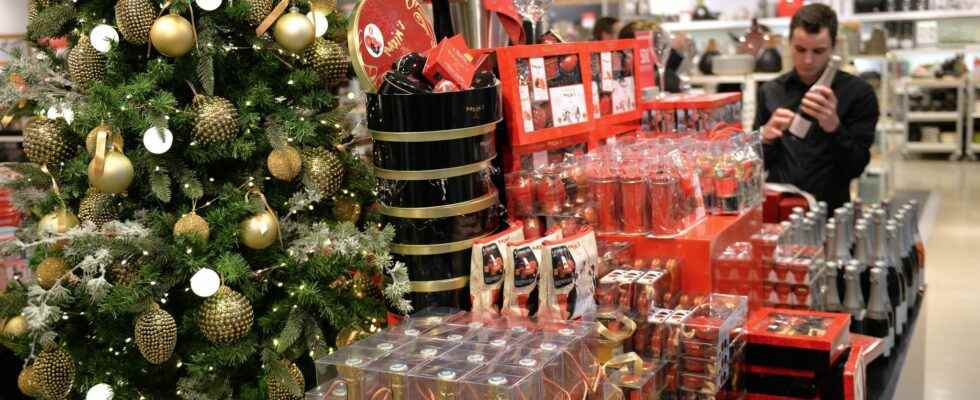In front of the doll department, in a Marseille hypermarket, Magali is pacing. She thinks about her 10-year-old daughter’s gift, but can’t decide. “The smallest plastic thing costs 30 euros, she blows. It’s impressive”. For her family, this year, the 40-year-old admits that Christmas will be different. Less abundant, both on the food side and for gifts. “The foie gras, anything extra, we won’t take it. And instead of cooking a capon like every year, I’ve planned chicken thighs,” she confides. The foot of the tree will also be less filled than in previous years. “We keep about the same budget for children’s gifts, but as prices have increased, they will have less.”
A few meters further, near the low-cost products of the Leader Price brand, Flavie, 57, does not hide her anger at the inflation which forces her to restrict her shopping during this Christmas period. “I’m not very proud of what I’m buying my grandchildren, but I can’t do otherwise this year, she says. It hurts my heart, but we still try to do what that we can.”
According to the figures provided by INSEE in its note on the economy published on Thursday 15 December, inflation reached 6.2% over one year in November in France – a figure identical to that of October. This price increase also affects the end-of-year holiday shopping basket. According to a study conducted by the NielsenIQ Institute for France info, the receipt for a Christmas meal for six people, with traditional products (such as foie gras, turkey, smoked salmon), increased by nearly 10 euros compared to last year, an increase 9.6%. Nevertheless, according to a Yougov study for the Ankorstore platform, 54% of respondents intend to dedicate the same envelope as last year to their Christmas purchases; 33% claim to reduce it.
Different consumption patterns
For Thomas, 28 years old, crossed at the bend of an electronic department, no question of depriving himself for Christmas. “It’s the only time of the year when I consider that I can let go financially. Even if it’s more complicated today, I still try to please my loved ones,” he says. . So, for the first time, the young man will ask at the cash desk for a payment spread over several months to manage to pay for this fashionable speaker so much wanted by his little brother. “On products where the amounts are large, people tend to ask us more for a staggered payment, so as to be able to better amortize”, observes Xavier Douais, president of the trade section of the Confederation of small and medium-sized enterprises ( CPME).
Same observation on the side of Philippe Gueydon, general manager of the King Toy group. “Each year, we set up a system of payment by check between October and November, but which will only be debited the following year, that is to say in 2023”, he explains to L’Express. “This year, this operation represents more than 20% of our turnover in those months. This is unprecedented”. Philippe Gueydon also notices a tendency for users to be “much more attentive to promotions”. If the toy sector has always been more or less spared by savings in household spending during the festive period, the general manager of King Toy notes however that if “the figures hold, the number of toys sold decreases”.
Some buyers, like Magali, do not trust the promotions, which she considers “false” and “too slow to consume”. To do good business, this mother relies on the Internet instead. “I spend a lot of time comparing prices between stores, websites and even catalogs, she says. “Before, I was less careful, but now I no longer have a choice.” A mode of consumption that confirms Xavier Douais: “People have become more professional in the way they search for the product, more attentive, and not just to the price.”
“We are scared of tomorrow, we dare less”
Saleswoman for a figurine store, La Geekerie, Françoise largely perceives this “cautiousness” when buying. “People watch, they come back, leave, watch again… They are much less likely to let go, we can see that,” she explains. “We are less serene, opines Marie, 65. Before, we could let go a little at the end of the year, but today we are scared of the next day. We know that we will be caught up in EDF bills and company, so we dare less.”
As for the federations and unions, it is still too early to draw an initial assessment of the Christmas races. “There is a difference between the perception of inflation and real inflation, points out Xavier Douais, of the CPME. This feeling of very high inflation has an impact on the behavior of buyers. But for the moment, we perceive rather a desire to have fun for the holidays.”
For many traders, the concern is elsewhere: that of a Christmas that could be their last. “The major obsession today is with the financial support of the State in relation to the big differential in energy prices. Many traders could go out of business”, comments Francis Palombi, president of the Confederation of Traders of France, which, “despite inflation, remains convinced that Christmas will be without disasters”.
According to the latest government announcements, from January 1, the “electricity damper” device will come into force. This aid should automatically reduce traders’ electricity bills by 15 to 20%. “But this is not enough in the face of increases which sometimes go up to 300% for certain businesses”, annoys Francis Palombi. In such an anxiety-provoking context, the president of the Confederation of French traders hopes that a victory for the Blues in the final of the Football World Cup, against Argentina on Sunday, will give balm to the hearts of the French. “Because the impulse to buy is dependent on the state of mind,” he concludes.
